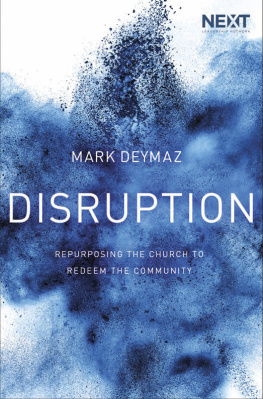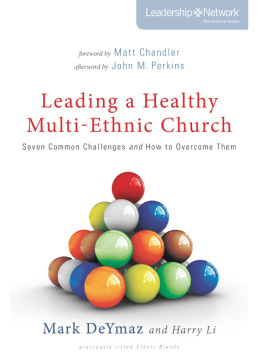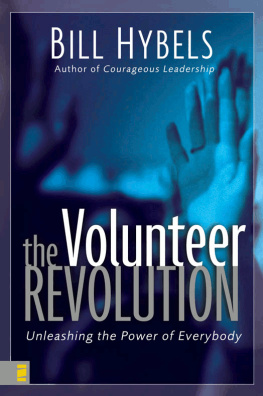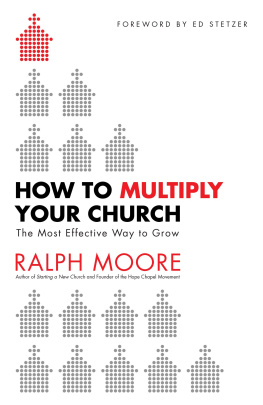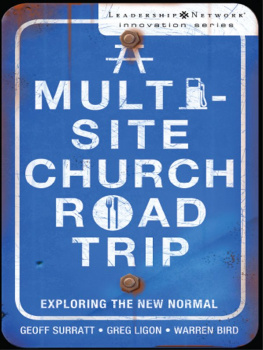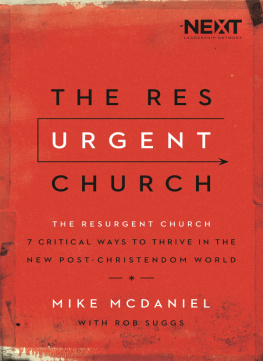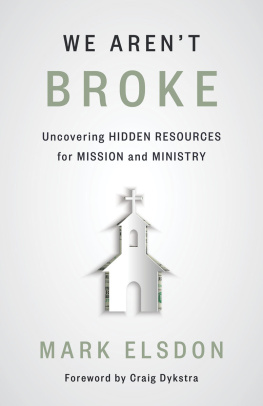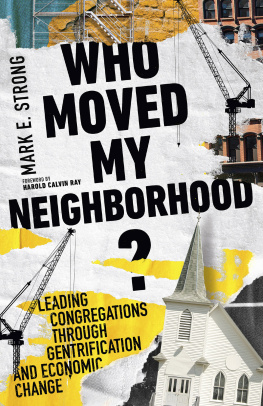Mark DeYmaz is one of the most creative thinkers I have had the privilege of meeting. To some extent he is a futurist, and in The Coming Revolution in Church Economics he challenges local churches to think innovatively in order to fund and fulfill the Great Commission. Toward that end, I have spoken many times on the subject of generosity; this book, however, takes us a step beyond generosity alone as part of the equation. I highly recommend a thoughtful reading of this engaging challenge.
Ron Blue , cofounder of the National Christian Foundation, founder of Kingdom Advisors, and author of seventeen books on personal finance, including Master Your Money
In The Coming Revolution in Church Economics , Mark and Harry give us a thoughtful path to innovation in church finance. But its more than thatthese proven leaders provide a practical plan to pursue greater mission through a better understanding and stewardship of resources. The fact is, churches and ministries can do more to advance the kingdom if they have more resources by which to do so. You and your leadership team will find this guide a helpful resource for effective ministry in the third millennium.
Ed Stetzer , Billy Graham Distinguished Chair, Wheaton College
With the burning heart of a prophet and the well-worn hands of a seasoned pastor, Mark DeYmaz offers a clarion call to innovate and engage in the task of economic capacity building, without which the local church will not be sustainable, nor will its gospel mission flourish.
Tom Nelson , pastor of Christ Community Church, president of Made to Flourish, and author of The Economics of Neighborly Love
This stimulating book is needed to stretch the financial imagination of every church in America. Immensely practical, it could have been titled Innovative Ways to Expand Your Churchs Mission by Strategically Leveraging Its Assets . It gives hope to churches uncertain of their long-term sustainability. More important, it offers a fundamental, systemic, and perhaps necessary shift in asset awareness and stewardship to help churches better position themselves for the future.
Warren Bird , PhD, vice president of research, Evangelical Council for Financial Accountability (ECFA), and coauthor of thirty-one books, including How to Break Church Growth Barriers
Ive stood in Mark and Harrys church and seen the reality of what they share in The Coming Revolution in Church Economics . Everyone who loves the local church and is concerned with its future funding and sustainability should read this book. It will cause a positive disruption to the way things have been done.
Ron Edmundson , CEO of Leadership Network, Dallas, TX
The authors break new ground with a much-needed perspective on the financial opportunities and challenges facing the church in the twenty-first century. If the mark of a good book is that you cannot put it down until it is fully read, then this book meets that test! Combining practical wisdom and examples with sound economic thinking and realistic experience in the non-profit and for-profit worlds, this book provides a breath of fresh air for churches that are unsure how to financially sustain their mission. They do not provide an unrealistic get rich quick silver bullet or a sketchy pyramid scheme; rather, they offer relevant, fresh, innovative, and entrepreneurial approaches. My prayer is that church planters and pastors will read this book and that the Holy Spirit will again breathe new vision and vitality into the church to transform society.
W. Jay Moon , director of the office of faith, works, and economics, Asbury Seminary
Mark and Harrys book isnt merely about creative ways to fund ministry. Rather, they provide practical pathways to establish more Christ-exalting, socially just, and economically responsible churcheseverywhere. Local church pastors and planters need to know how to apply smart economics in todays fast-paced and rapidly changing economy. Those who lead church planting networks and endeavors need to grapple with the ideas and solutions theyve developed. This book will show you how to carry mission into the future and, more than that, sustain the effort.
Daniel Yang , director of the Send Institute at the Billy Graham Center, Wheaton College
Mark DeYmaz is one of the most innovative, prophetic leaders in the church today. He asks tough questions and does not shrink from challenging conversations or difficult assignments. Rather, he leans into them for the sake of the kingdom... and for us. Local church leadership, too, must lean into changing economic realities and not bury its head in the sand by citing empty platitudes of hope that do not require intentional effort on our part. Now is the moment the church must develop additional revenue streams and resources to fund transformative ministry in the community. This book, then... Ready. Set. Lets GO!
Rev. Dr. Stephanie Moore Hand , vitality strategist for the Western North Carolina Conference of the United Methodist Church
Mark and Harry have done something in The Coming Revolution in Church Economics that is very rare but extremely important. With sensitivity and through innovation, they not only open the door but provide proven, practical insight to help local church pastors and ministry leaders rethink sustainability and apply forgotten methods of stewardship to maximize kingdom impact.
Santes Beatty , director of multiethnic ministries, The Wesleyan Church
Pastors of existing churches and church planters today are looking for additional funding to move the vision of the kingdom forward. In The Coming Revolution in Church Economics , Mark and Harry provide proven insight to help overcome stagnant giving and declining budgets by generating additional income to sustain ministry. How can we strategically reposition our churches as agents of transformational change in the community? How can the church develop more than one stream of income and increase its influence in the community? This book answers these questions, and many more.
Noemi Chavez , pastor of Revive Church, Long Beach, CA
Mark DeYmaz hits the nail on the head! In the future, local churches will not be funded or sustained as they have been in the past. The sooner pastors and planters recognize this and adjust, the sooner their churches will be able to not only survive but thrive in a rapidly changing world.
Dr. Alejandro (Alex) Mandes , leader of the All People Initiative of the EFCA, Immigrant Hope, and GATEWAY Theological Institute
Marks take on past and present funding models and what will be required in the future to ensure local church sustainability is well worth understanding. I appreciate the books sound theological reflection, as well as its practical instruction that pastors in every context will find immediately stimulating and applicable.
Bob Roberts , founder and senior pastor of Northwood Church, Keller, TX
This isnt theory. What youre about to read in this book are proven principles to bless your community, create multiple streams of income for your church, and better fulfill the Great Commission in todays changing world. Dont miss The Coming Revolution in Church Economics !
Daniel Im , director of NewChurches.com, teaching pastor of The Fellowship, Nashville, TN, and author of No Silver Bullets and You Are What You Do: And Six Other Lies about Work, Life, and Love
In The Coming Revolution in Church Economics , Mark DeYmaz details a strategy that will enable churches to drive massive socioeconomic transformation in the communities they serve, advance their core mission, and generate income in pursuit of sustainability. This is a must-read for pastors seeking to reverse declining budgets and see their churches financially thrive.


